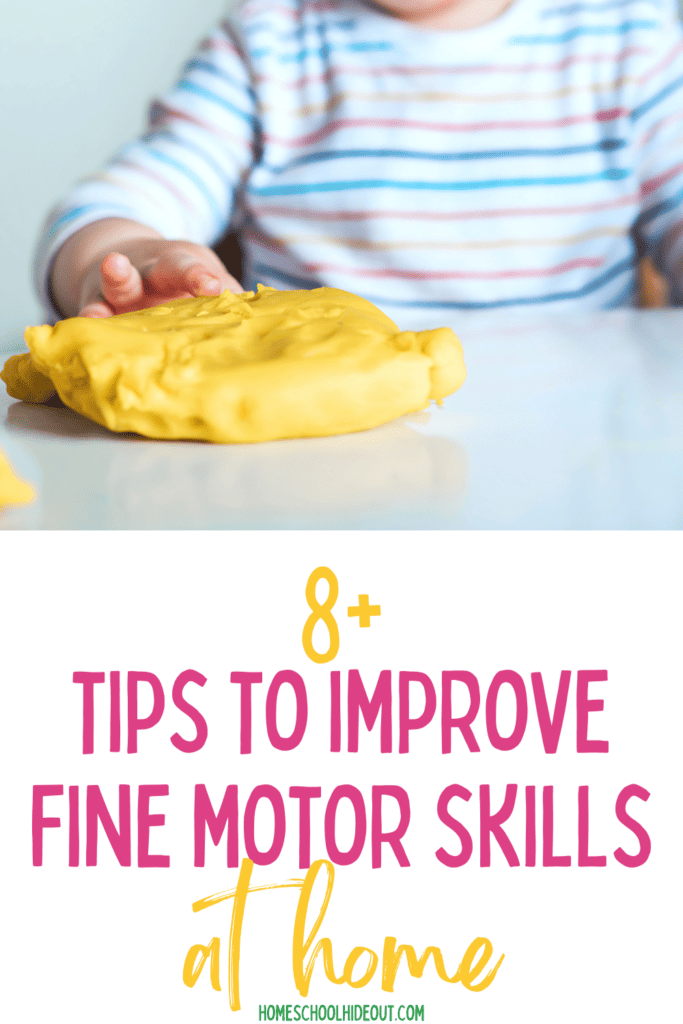Looking to improve your child’s fine motor skills at home?
Engaging in DIY games and projects at home is an excellent way to enhance fine motor skills for both children and adults. Fine motor skills are essential for completing everyday tasks and are developed through practices that involve small muscle movements. While there are numerous ways to foster these skills, home-based activities offer a unique opportunity to blend learning with play in a comfortable and familiar environment. However, these are complementary activities and are not substitutes for professional advice or therapy. If a child has specific challenges with motor skills or other developmental concerns, it’s crucial to consult with a therapist or healthcare professional. The activities mentioned are general examples and should be adapted to each child’s individual needs and abilities.
By creating and participating in various fine motor activities, you can potentially improve hand-eye coordination, dexterity, and overall hand strength. These activities range from crafting small objects to assembling puzzles, ensuring there’s always something new to explore. Not only are these games and projects enjoyable, but they’re also instrumental in building the precision and control needed for more intricate tasks.
Key Takeaways
- DIY games at home can significantly boost fine motor skills.
- A wide range of activities offers diverse skill development.
- Regular engagement in these activities leads to improved dexterity.
Essential DIY Fine Motor Skills Games
Developing fine motor skills is important for young children, as it aids in building muscle strength and coordination in their hands and fingers. Simple and engaging activities at home can effectively support your child’s dexterity and control in a more relaxed environment.
Playdough and Clay Creations
Utilize play dough or clay to encourage your child to roll, squeeze, and sculpt. Creating shapes and figures with these malleable materials not only promotes creativity but also strengthens their hand and finger muscles. Encourage your toddler or preschooler to use tools like rollers and stamps to refine their pincer grasp.
Cutting and Threading Activities
Cutting with child-safe scissors is a great way to practice hand coordination. Begin with simple lines and gradually move on to more complex shapes. In threading activities, encourage your preschooler to string beads, pasta, or buttons onto laces or pipe cleaners, which aids in improving their hand-eye coordination and dexterity. It’s important to closely monitor your child during these activities to ensure safety, especially when they’re handling scissors or small objects.
Arts and Crafts Projects
Delve into arts and crafts, a treasure trove of fine motor development. Provide materials like stickers, crayons for coloring, or paper for folding, and let the creativity flow. Engage them in painting and drawing to improve control over their fingers while using different art tools.
Building and Construction Challenges
Blocks, LEGO, and sticks can be used for building challenges that bolster fine motor skills. Have your child stack, balance, and create structures. This not only improves their muscle strength but also involves precision and problem-solving.
Puzzles and Sorting Games
Puzzles offer an array of benefits including sorting shapes and fitting pieces together. This type of game enhances both cognitive skills and fine motor control. Sorting small items like pom poms, buttons, or coins is also an excellent way for your child to refine their fine motor abilities.
Enhancing Fine Motor Skills through Daily Activities
Incorporating fine motor skill development into your everyday life can be simple and effective. By utilizing common household items and turning daily routines into fun activities, you can help young children build independence and coordination and improve fine motor skills at home.
Kitchen Fun with Tongs and Tweezers
Using kitchen tongs and tweezers, you can create engaging activities in the comfort of your home. Encourage your child to transfer items such as ice cube tray fillings or marbles from one place to another. This not only strengthens their grip but also improves hand-eye coordination.
- Activity: Using tongs, move pom poms into an ice cube tray.
- Activity: Sort buttons or pegs with tweezers into different containers.
Dressing and Eating Independence
Daily acts of dressing and eating provide ample opportunity for practicing fine motor skills. Teach your child to handle zippers and practice tying shoelaces to enhance dexterity. During meals, guide them to use utensils properly, fostering eating independence.
- Dressing: Practice zipping up coats and tying shoelaces.
- Eating: Encourage your child to eat with utensils to develop grip strength and control.
Garden and Nature Exploration
Head outdoors for a session of garden and nature exploration. Have your child pick up various sizes of stones with kitchen tongs or craft sticks and pipe cleaners into shapes, adding a dose of creativity to their motor skill development.
- Activity: Use tongs to collect and sort different sizes of stones.
- Activity: Thread pipe cleaners through holes in a colander or make shapes with sticks.
Conclusion
Developing your fine motor skills is essential for carrying out everyday tasks with ease. Through various DIY games and activities, you can engage both children and adults in improving these skills. It’s important to incorporate such exercises into your routine, selecting those that are not only effective but also enjoyable. By doing so, you strengthen your dexterity and hand-eye coordination, which are integral to your daily life.







